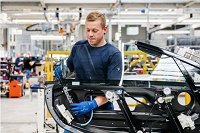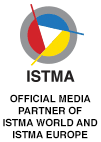BMW Group sees growth in use of 3D printed parts
27.11.2018
German automotive giant, the BMW Group, has seen the use of 3D-printed components in its models rising, with more than a million parts manufactured over the past decade.
 The Munich-based company expects the output from the BMW Group Additive Manufacturing Centre to reach over 200,000 components in 2018 – marking a 42% increase on last year’s total. “The use of components made by additive manufacturing in series production of vehicles is increasing particularly strongly at the moment,” said Jens Ertel, director of the BMW Group additive manufacturing centre. According to Ertel, BMW is following the development and application of the advanced manufacturing method “very closely”, partly through its longstanding cooperation with leading manufacturers in the field.
The Munich-based company expects the output from the BMW Group Additive Manufacturing Centre to reach over 200,000 components in 2018 – marking a 42% increase on last year’s total. “The use of components made by additive manufacturing in series production of vehicles is increasing particularly strongly at the moment,” said Jens Ertel, director of the BMW Group additive manufacturing centre. According to Ertel, BMW is following the development and application of the advanced manufacturing method “very closely”, partly through its longstanding cooperation with leading manufacturers in the field.
“At the same time, we are engaging in targeted technology scouting and evaluating innovative production systems,” he added. Recently the BMW Group fitted its one-millionth 3D-printed component in series production: a plastic window guide rail for the BMW i8 Roadster. The rail took five days to develop and was integrated into series production in Leipzig shortly after, BMW said in a release on 13 Nov. The part is found in the door of the BMW i8 Roadster and allows the window to operate smoothly. The component is manufactured by HP Multi Jet Fusion Technology, a high-speed method enhanced by the BMW Group in conjunction with HP and now in use in the series production of vehicles for the very first time. The company can produce up to 100 window guide rails in 24 hours. The window guide rail is the second 3D-printed component in the BMW i8 Roadster. The first was the aluminium alloy fixture for the soft-top attachment.
Meanwhile, BMW has noted the importance of the personalisation trend in the development of its 3D-printed parts. With the its “Mini Yours Customised” product initiative, BMW customers can design selected components themselves, such as indicator inlays and dashboard trim strips. Customers can create their designs at the online shop and the parts are then 3D-printed to specification. Mini Yours Customised was awarded the gold German Innovation Award by the German Design Council earlier this year. The German carmaker announced, in April, plans to invest more than €10m in a new Additive Manufacturing Campus, in Oberschleissheim, north of Munich.
The new facility will allow the company to continue developing its expertise in this field of work. The campus, said Udo Hänle, head of production integration and pilot plant, will consolidate the full spectrum of the BMW Group’s 3D printing expertise at a single location. The campus will work in much the same way as a pilot plant and develop technologies for use within the network. Much of the work carried out at the campus will focus on parts manufacturing for prototype construction, series production and customised solutions, according to BMW. The campus will also act as an interdisciplinary training and project area, for instance for development engineers. Located in an existing building, with an area of 6,000 square metres, the campus will accommodate up to 80 associates and over 30 industrial systems for metals and plastics.
It is scheduled to go on stream in early 2019.


































